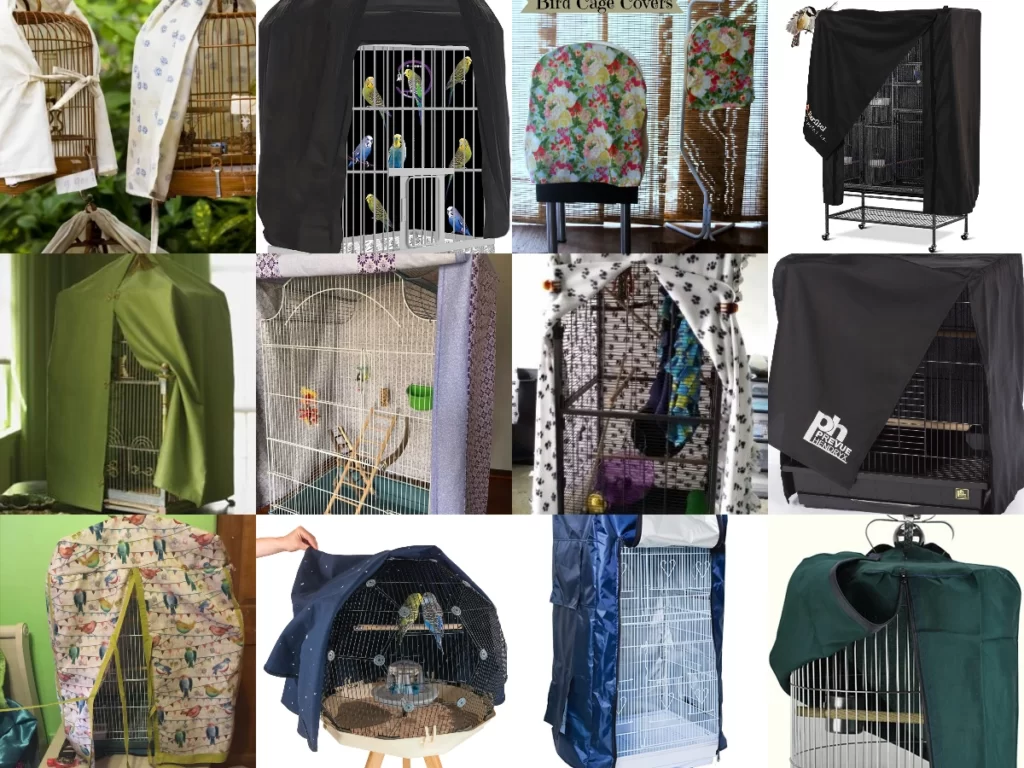Yes, covering your budgie’s cage at night is beneficial. It enhances their sleep, reduces stress, and protects from external disruptions.
However, choose breathable, bird-safe materials like soft thermal blankets or lightweight covers.
Ensure you cover the cage when it’s the budgie’s natural bedtime, adjusting for room conditions and seasons.
If you’re a budgie owner or looking to become one, understanding their nighttime needs is crucial.
One question that often comes up is whether to cover their cage at night and how to do it right.
From my many experiences with these birds, I’ve realized the importance of this practice.
This guide will provide insights on why it’s essential, the benefits, potential risks, and much more.
Taking care of our feathered friends, especially budgies, requires a deep understanding of their needs.
Ensuring they get the right care, especially during the night, plays a crucial role in their overall well-being.

Reasons for Covering a Budgie’s Cage at Night
When the sun sets and the world dims its lights, our budgie friends, just like us, prepare for a night of rest.
But what do these lovely creatures require to ensure they sleep soundly?
Let’s dive deep.
Understanding the Needs and Behaviors of Budgies at Night
Budgies are naturally diurnal, meaning they’re most active during the day. As the night approaches, they look for a secure and comfortable spot to rest.
Just like the routine we have before hitting the sack, budgies also have their own nighttime rituals.
They might preen their feathers, chirp a goodnight song, or find that perfect perch to nap on.
Ensuring they have a conducive environment for sleep is pivotal for their health and mood.
Benefits of a Consistent Nighttime Routine
Consistency is key in many aspects of life, and it’s no different for our budgies.
Providing them with a consistent nighttime routine ensures they get adequate rest, which is essential for their mental and physical well-being.
A well-rested budgie is more active, chirpy, and exhibits vibrant health.
Why Cover a Budgie Cage at Night?
The idea behind covering a budgie’s cage at night stems from their need for a dark and quiet environment.
In their natural habitat, budgies would experience the calm and darkness of night, which helps signal their bodies that it’s time to rest.
In our homes, artificial lights and noises can disrupt this natural rhythm.
Covering their cage provides them with an environment reminiscent of their natural nighttime surroundings.
Benefits of Covering a Budgie’s Cage at Night
Offering our budgies the comfort of a covered cage at night isn’t just a whimsical choice.
There are tangible benefits to this practice. Let’s explore some of them.
Natural Sleep Cycle Enhancement
Covering a budgie’s cage aids in creating a dark environment, which in turn promotes melatonin production in birds.
Melatonin is a hormone responsible for regulating sleep. This helps in reinforcing a natural sleep cycle, ensuring your budgie gets restorative sleep.
Protection from External Disturbances
Imagine being jolted awake in the middle of the night by a random noise or a sudden burst of light.
It’s the same for budgies. Covering their cage ensures they’re shielded from unexpected disturbances like car headlights shining through a window or loud noises.
It gives them a sense of security, ensuring they sleep undisturbed.
Reducing Disturbances and Stress
A peaceful night leads to a stress-free budgie. By limiting disturbances, we ensure our budgies aren’t startled or stressed.
Chronic stress in budgies can lead to health issues and behavioral problems.
Ensuring they have a serene environment to rest in reduces such risks.
Remember, a happy budgie is a healthy budgie!
Risks and Concerns of Covering a Budgie’s Cage
Just as there are benefits to covering a budgie’s cage at night, there are also some risks and concerns to be aware of.
After all, every coin has two sides. Let’s explore some potential issues that might arise and how best to prevent them.
Inadequate Air Circulation
Covering a cage can sometimes hinder the flow of fresh air. Inadequate air circulation can be harmful to budgies as they need a continuous supply of fresh air to breathe comfortably.
Think of it like a stuffy room; we wouldn’t like to sleep in a room without ventilation, and neither would budgies.
Overheating or Chilling
Budgies are sensitive to temperature changes. If the cover material isn’t breathable or if the room gets too warm, there’s a risk of overheating.
Conversely, if the room’s too cold and the cover doesn’t provide enough insulation, our feathery friends could feel chilly.
It’s all about finding the right balance to ensure their comfort.
Potential Risks of Covering a Budgie’s Cage
Some other potential risks might include the budgie getting tangled in loose fabric, the cover causing undue stress if not introduced properly, or even unwanted pests hiding in the cover material.
It’s crucial to be observant and ensure that our intentions to provide comfort don’t inadvertently cause harm.
Safety and Well-Being Considerations
Here are some insights and tips to keep in mind when implementing nighttime routines.
Understanding the Budgie’s Response to Darkness
While it’s natural for budgies to sleep in the dark, a sudden change can be startling.
Observing how your budgie responds to the darkness can provide insights into their comfort levels.
Some might take to it immediately, while others might need a gradual introduction.
Tips for Ensuring the Budgie is Comfortable and Secure
- Introduce the cover gradually: Start by covering the cage partially and increase coverage over time.
- Check the temperature: Ensure the room is neither too hot nor too cold.
- Ensure ventilation: Even while covered, ensure there’s enough air circulation.
Nighttime Routine for Budgie Care
Consistency is comforting for budgies. Establishing a regular nighttime routine, like covering their cage at the same time every night or playing soft music before bedtime, can be reassuring.
This routine signals it’s time to wind down, and over time, your budgie will anticipate and appreciate it.
Best Materials to Cover a Budgie’s Cage
The material used to cover the cage plays a significant role in ensuring the comfort and safety of our feathered friends.
Here are some recommendations and considerations.
What Materials are Safe for Covering a Budgie’s Cage?
Materials that are breathable, soft, and non-toxic are ideal for budgies. You’d want something that allows air circulation, doesn’t have loose threads, and is free from harmful chemicals.
Soft Breathable Thermal Blanket
A soft breathable thermal blanket strikes a balance between keeping the budgie warm and ensuring adequate ventilation.
It’s soft, comfortable, and provides the insulation needed without the risk of overheating.
Lightweight Covers
Lightweight covers like cotton sheets can be ideal during warmer months. They block out light and disturbances without trapping too much heat.
Bird-safe Covers
There are covers specifically designed for bird cages. These are typically made of safe materials, are breathable, and fit snugly on bird cages.
Pros and Cons of Different Materials Like Blankets, Sheets, and Towels
| Material | Pros | Cons |
|---|---|---|
| Blankets | Warm, soft, can be thermally insulating | Might be too warm, risk of suffocation |
| Sheets | Lightweight, breathable | Might not provide enough insulation |
| Towels | Absorbent, can provide insulation | Can be heavy, risk of loose threads |
Proper Techniques to Cover a Budgie’s Cage
Covering a budgie’s cage isn’t just about throwing a sheet over it.
Like all things related to pet care, there’s a right way to do it.
This ensures that our feathered friends are comfortable, safe, and can rest well.
Ensuring Proper Ventilation
Ventilation is vital. Budgies need a constant flow of fresh air. When covering the cage, always ensure that the material is breathable.
It’s also a good idea to leave some part of the cage, like the bottom, slightly open to allow air circulation.
This way, even if the cage is covered, there’s a continuous supply of air.
Importance of Covering the Entirety vs. Partially Covering
When we talk about covering a cage, there are two main methods: covering entirely and partially covering.
- Covering the cage entirely: This method provides a dark environment, mimicking nighttime. It can be especially useful in places where there’s a lot of artificial light, ensuring your budgie understands that it’s bedtime.
- Partially covering the cage: This means leaving some parts of the cage exposed. This can be helpful to ensure ventilation or if your budgie is new to being covered and needs to adjust slowly.
Covering Techniques for a Budgie’s Cage
- Loose draping: This method involves loosely draping the cover over the cage. It ensures maximum ventilation.
- Tucking in: Here, the cover is more securely placed around the cage, reducing light and disturbances but ensuring a part is open for air.
- Specialized bird cage covers: These are designed specifically for bird cages and often have features like a drawstring to ensure a snug fit.
Time to Cover Your Budgie’s Cage
Our budgies have their own natural rhythm. Being in tune with that can make bedtime a peaceful experience for them.
Natural Bedtime for Budgies
Budgies, like most birds, follow the sun’s cycle. Their natural bedtime is around sunset.
As it starts getting dark outside, you’ll notice your budgie becoming less active, signaling that it’s time for rest.
Factors Affecting the Best Time, e.g., Seasonality, Room Lighting
However, various factors can affect when you should cover your budgie’s cage:
- Seasonality: During winter, days are shorter, so sunset might be earlier. Conversely, in summer, days are longer.
- Room Lighting: If a room has a lot of artificial lighting, it might confuse the budgie’s natural sleeping pattern. In such cases, you might need to cover the cage earlier to signal bedtime.
When is the Best Time to Cover My Budgie’s Cage?
To determine the best time, observe your budgie. When it starts to quiet down and perch for rest, it’s an indicator.
For most budgies, this is typically around 7-8 PM (19:00-20:00). Adjust this based on the factors mentioned above.
Alternative Approaches
Covering the cage is one approach, but there are other ways to ensure your budgie has a good night’s rest.
Should You Leave a Night Light on for Budgies?
Some budgies get startled in the complete dark, especially if there are unfamiliar sounds.
A soft night light can provide them with a sense of security.
However, ensure it’s not too bright, as budgies need darkness to sleep.
Other Methods to Provide Comfort Without Completely Covering the Cage
- Music or white noise: Soft sounds can drown out sudden noises, helping your budgie stay relaxed.
- Partial covers: As mentioned earlier, you don’t always need to cover the cage entirely. A partial cover can be a good compromise.
- Placing the cage in a quiet room: If possible, keeping the cage in a room with fewer disturbances at night can be beneficial.
Faqs
Is It Okay to Cover a Budgie’s Cage at Night?
Yes, it’s okay and even recommended to cover a budgie’s cage at night.
It helps signal bedtime and protects them from disturbances.
What Material Is Best to Cover a Budgie’s Cage?
Soft, breathable materials like cotton sheets or lightweight covers are ideal. They ensure ventilation while providing a dark environment for the budgie.
Do Budgies Require a Night Light if Their Cage Is Covered?
Not necessarily, but a soft night light can be beneficial for budgies that get startled easily.
It offers them a sense of security.
How to Ensure Your Budgie Is Not Afraid of the Dark?
Gradually introducing the covering routine and using a dim night light can help.
Also, ensure there are no sudden loud noises around bedtime.
How Can I Ensure Proper Air Circulation When Covering My Budgie’s Cage?
Use breathable materials and avoid covering the cage entirely. Leaving a small portion, like the bottom, open can ensure continuous air flow.
Are There Specific Signs That Indicate My Budgie Is Uncomfortable With the Covered Cage?
Yes. If your budgie is making distressed sounds, trying to escape, or shows signs of restlessness, it might be uncomfortable with the cover.
Can Using the Wrong Material Harm My Budgie?
Potentially, yes. Materials that block air circulation can lead to respiratory issues.
Also, some materials might have loose threads that could entangle the bird.
Does the Thickness of the Cover Material Affect My Budgie’s Sleep?
Yes. Thicker materials can block out light and noise better, but they may also reduce ventilation.
It’s a balance between darkness and breathability.
What Precautions Should I Take in Different Seasons When Covering the Cage?
In winter, ensure the covering doesn’t make the cage too cold. In summer, prioritize ventilation to avoid overheating.
How Do I Transition My Budgie to a New Covering Routine?
Start gradually. Initially, cover the cage partially and for shorter durations. Over time, your budgie will get used to it.
What Are the Long-Term Effects of Not Covering a Budgie’s Cage at Night?
Budgies might experience disturbed sleep, which can lead to stress and health issues over time.
Are There Any Specific Brands Known for Budgie-Safe Cage Covers?
While many brands offer bird-safe covers, it’s always best to read reviews and ensure the material is soft, breathable, and without hazardous elements.
Should I Alter the Covering Routine Based on My Budgie’s Age or Health?
Yes. Younger and older budgies might have different needs. Similarly, a sick budgie might benefit from a warmer environment.
Are There Any Specific Situations When I Shouldn’t Cover My Budgie’s Cage at Night?
If your budgie shows signs of respiratory distress or is new to its environment, hold off covering until they’re more settled or consult a vet.



